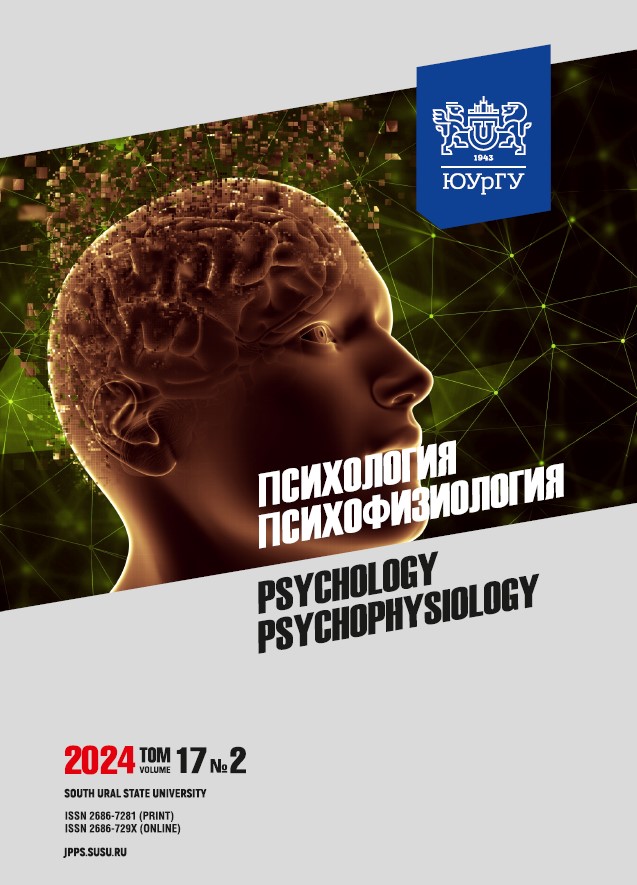An examination of resilience among novice educational leaders: a comparative analysis based on evaluation styles and innovative activity variants
Abstract
emergent challenges, plays a pivotal role in the professional development of individuals within dynamic fields such as education. Prior research has underscored the significance of resilience among educational leaders, particularly in relation to their ability to integrate the complexities of organizational culture and learning outcomes. This study seeks to explore the nuanced aspects of resilience exhibited by novice educational leaders, focusing on how their evaluation styles – characterized by either positive or negative perceptions – and their readiness for innovation influence these dynamics. Aim: to investigate the unique facets of resilience demonstrated by educational organization leaders, contingent upon their approach to innovation and their evaluation style preferences. Materials and methods. The study encompasses a sample of novice school administrators with less than three years of experience (n = 41). A multifaceted methodology of the study includes “Human resilience” (E.A. Rylskaya); “Choice of proverbs” (N.V. Markina), “Evaluation Style/ES” (N.V. Baturin, I.V. Vyboyschik); “Determination of success” (E.E. Sapogova, I.V. Trukhacheva), alongside statistical analyses via Spearman's rank correlation coefficient and the Mann–Whitney U-test. Results. The analysis reveals significant correlations between the intensity and complexity of human resilience and indicators of evaluation style, attitudes towards success, and value-semantic orientations within both proactive and situationally cautious approaches to innovative activity. Furthermore, distinctions emerge based on the valence of the evaluation style, whether positively (“optimistic”) or negatively (“pessimistic”), influencing the activation of various resilience mechanisms essential for addressing professional challenges. Conclusion. The study concludes that the preference for positive or negative evaluations (evaluation style) and the degree of readiness for innovation significantly shape the expression of resilience among educational leaders, thus being of critical importance in determining the effectiveness of resilience strategies for professional task management.
Downloads
References
(in Russ.). DOI: 10.14529/jpps230303.
2. Abakumova I.V., Ryadinskaya Ye.N. Value-semantic attitudes as a factor for social integration of personality under the conditions of armed conflict. Vestnik Udmurtskogo universiteta. Seriya Filosofiya. Psikhologiya. Pedagogika = Bulletin of Udmurt University. Series Philosophy. Psychology. Pedagogy. 2017;27(1):52–58. (in Russ.).
3. Ananev B.G. O problemakh sovremennogo chelovekoznaniya [About the problems of modern human knowledge]. St. Petersburg, Piter. 2001:260. (in Russ.).
4. Makhnach A.V., Laktionova A.I. Zhiznesposobnost podrostka: ponyatie i kontseptsiya [Adolescents resilience: the notion and concept]. Psikhologiya adaptatsii i sotsialnaya sreda: sovremennye podkhody, problemy, perspektivy [Psychology of adaptation and social environment: modern approach-es, problems, prospects]. Ed. L.G. Dikaya, A.L. Zhuravlev. Moscow. Institute of Psychology of the Russian Academy of Sciences Publ. 2007:290–312. (in Russ.).
5. Makhnach A.V. Resilience in conditions of uncertainty. Institut psikhologii Rossijskoj akademii nauk. Organizacionnaya psikhologiya i psikhologiya truda = Institute of psychology of the Russian Academy of Sciences. Organizational psychology and labor psychology. 2020;5(4):131–166. (in Russ.). DOI: 10.38098/ipran.opwp.2020.17.4.006.
6. Mazilov V.A., Rylskaya E.A. The viability of a person: methodological issues of the study. Yaroslavskii psikhologicheskii vestnik = Yaroslavl Psychological Bulletin. 2016; 36: 55–62.
7. IJntema R.C., Schaufeli W.B., Burger Y.D. Resilience mechanisms at work: The psychological immunity-psychological elasticity (PI-PE) model of psychological resilience. Current Psychology. 2023;42:4719–4731. DOI: 10.1007/s12144-021-01813-5.
8. IJntema R.C., Burger Y.D., Schaufeli W.B. Reviewing the labyrinth of psychological resilience: Establishing criteria for resilience-building programs. Consulting Psychology Journal: Practice and Research. 2019;71(4):288–304. DOI: 10.1037/cpb0000147.
9. Makhnach A.V., Plyushcheva O.A. Resiliency of specialists in the caring professions. Sotsialnye i gumanitarnye nauki na Dalnem Vostoke = The Humanities and Social Studies in the Far East. 2020;4(17):68–78. (in Russ.). DOI: 10.31079/1992-2868-2020-17-4-68-78.
10. Tarasova E.V. Coping-resources and in resilience the professionof the psychologist-consultant: literary review. Vestnik Pskovskogo gosudarstvennogo universiteta. Seriya: Psikhologo-pedagogicheskie nauki = Bulletin of Pskov State University. Series: Psychological and pedagogical sciences. 2020;11:135–138. (in Russ.)
11. Chigrina A.A., Bagrationi K.A., Nestik T.A. Development of theoretical model for collective resilience. Organizatsionnaya psikhologiya = Organizational Psychology. 2020;10(2):151–171. (in Russ.)
12. Pereira V., Temouri Y., Patel C. Exploring the role and importance of human capital in resilient high performing organizations: Evidence from business clusters. Applied Psychology. 2020;69:769–804. DOI: 10.1111/apps.12204.
13. Adiguzel V., Tan K., Okanlı A. The effect of compassion on psychological resilience: a study of healthcare professionals. Current Psychology. 2023:1–9. DOI: 10.1007/s12144-023-05169-w.
14. Deniz S., Çimen M., Yüksel O. The effect of psychological resilience on work stress: a study of hospital workers. Journal of Business Science. 2020;8(2):351–370. DOI: 10.22139/jobs.741576.
15. Labrague L.J., de Los Santos J.A.A. Resilience as a mediator between compassion fa-tigue, nurses work outcomes, and quality of care during the COVID-19 pandemic. Applied Nursing Research. 2021;61. DOI: 10.1016/j.apnr.2021.151476.
16. Linkov I., Trump B.D. The Science and Practice of Resilience. Publ. Springer Cham. 2019:209. DOI: 10.1007/978-3-030-04565-4.
17. Vyboyshchik I.V. Evaluation style as a factor of accuracy of evaluation. Vestnik Yuzhno-Uralskogo gosudarstvennogo universiteta. Seriya: Psikhologiya = Bulletin of the South Ural State University. Series: Psychology. 2008;32(132):29–36. (in Russ.).
18. Butorina O.S., Rylskaya E.A. Resilience in the structure of the personal and professional potential of a leader. Institut psikhologii Rossiskoi akademii nauk. Organizacionnaya psikhologiya i psikhologiya truda = Institute of psychology of the Russian Academy of Sciences. Organizational psychology and labor psychology. 2017;2(4):134–151. (in Russ.).
19. Sapogova E.E. Ekzistentsialnaya psikhologiya vzroslosti [The existential psychology of adulthood]. Moscow. Smysl. 2013:767. (in Russ.).
References on translit
-Copyright (c) 2024 Psychology. Psychophysiology

This work is licensed under a Creative Commons Attribution-NonCommercial-NoDerivatives 4.0 International License.



